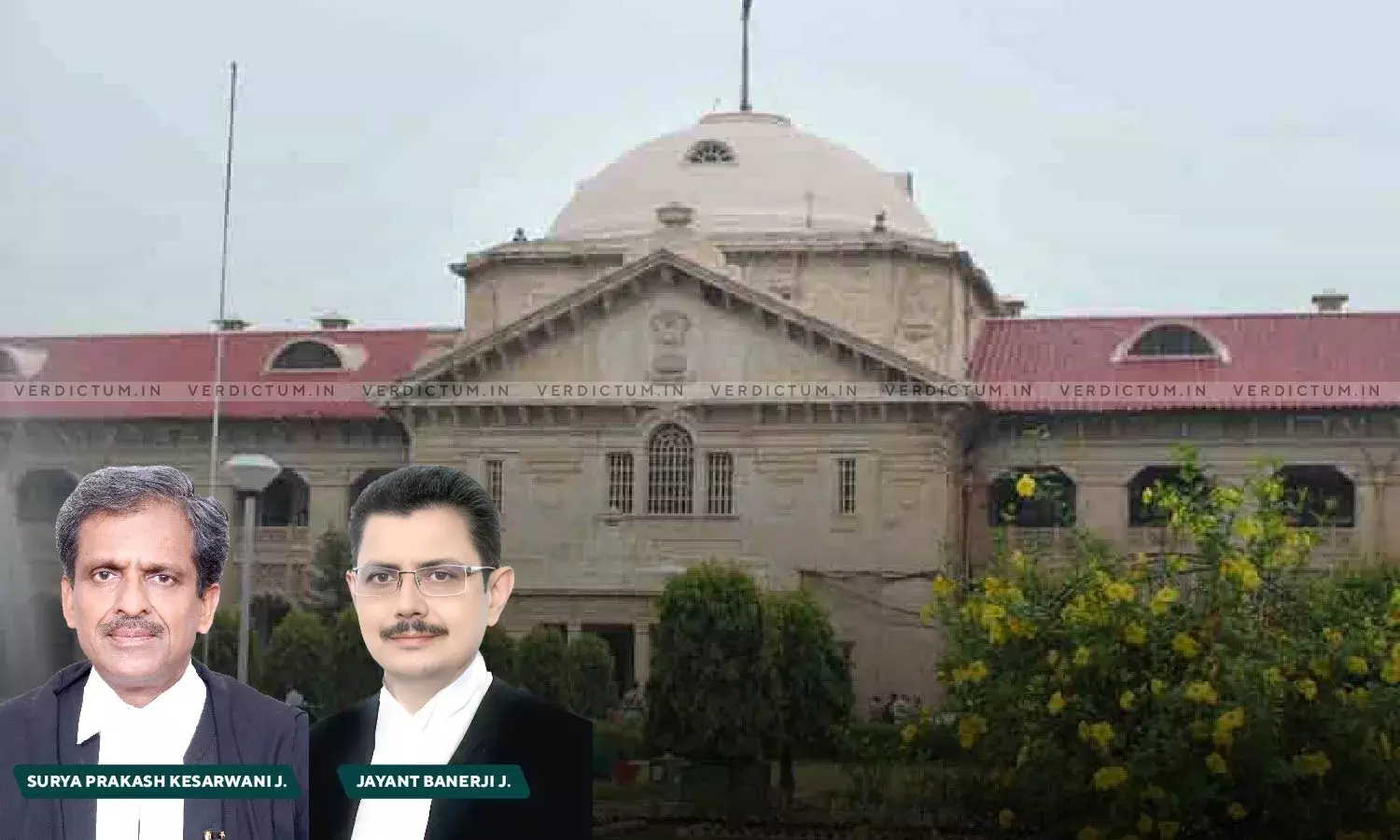Appointment Of Senior IPS Officer As Head Of UP Directorate Of Prosecution Is Illegal, Without Authority Of Law: Allahabad HC

The Allahabad High Court has declared the appointment of senior IPS officer Ashutosh Pandey as the head of the Uttar Pradesh Directorate of Prosecution as illegal and without the authority of law.
The Court said the appointment was contrary to statutory provisions of the Code of Criminal Procedure (CrPC), which states that a person holding this post must be in practice as an advocate for not less than 10 years and such an appointment should be made with the concurrence of the chief justice of the state's high court.
The Bench of Justice Surya Prakash Kesarwani and Justice Jayant Banerji observed, "A writ of quo warranto can be issued when a person holding the public office does not fulfil the eligibility criteria prescribed for appointment to such an office or when the appointment is contrary to the statutory provisions."
Allowing a petition filed by Kishan Kumar Pathak, the Bench observed, "Provisions of section 25A(2) of the CrPC are mandatory. In the present case, Ashutosh Pandey, neither possesses the essential qualification nor his appointment has been made with the concurrence of the chief justice of the high court."
Advocates Rahul Mishra and Sanjay Mishra appeared for the Appellant while CSC Pankaj Rai appeared for the Respondents before the High Court.
It was contended by the Appellant before the Court that since the Respondent is holding a public office and he does not have the eligibility to hold the said post i.e. post of Director of Prosecution/Additional Director of Prosecution/Deputy Director of Prosecution and, therefore, he has incurred disqualification to continue to occupy the post.
It was prayed before the Court that a writ of quo warranto be issued in view of the provisions of Section 25A CrPC.
While the Respondent had argued before the Court that the provisions of Section 25A CrPC are not mandatory but directory, and therefore it is not a compulsory obligation of the State Government to abide by the provisions of the aforesaid Section.
The High Court placed reliance on a catena of judgments of the Apex Court to hold, "In view of the law settled by Hon'ble Supreme Court as discussed above we hold that the essential qualification as provided in Section 25A(2) Cr.P.C. for the post of Director of Prosecution or Dy. Director of Prosecution shall prevail over the qualification for the said posts provided under the office memorandum dated 27.11.1980."
The Court also adjudicated upon the issue of whether Sections 24, 25 and 25A CrPC needs to be understood as a Singular scheme. In this context, the Bench observed, "...while Sections 24 and 25 Cr.P.C. provide for appointment of Public Prosecutor, Addl. Public Prosecutor, Special Public Prosecutor and Assistant Public Prosecutor, Section 25A provides for establishment of Directorate of Prosecution and the hierarchy for smooth, independent and efficient functioning of the Directorate of Prosecution."
Further, while observing so, the Court thus held that Sections 24, 25 and 25A are part of one singular Scheme which makes a perceptible demarcation and compartmentalization for the Public Prosecutor in the High Court and District Courts and administrative control and hierarchy in the Department of Prosecution i.e. Directorate of Prosecution.
The Court also touched upon the issue of whether Section 25A CrPC is mandatory in nature. The Bench while dealing with the issue, said, "Once a Directorate of Prosecution has been established in the State of Uttar Pradesh, the qualification of Director of Prosecution and Dy. Director of Prosecution as provided in sub section (2) of Section 25A are mandatory particularly when Section 25A(2) Cr.P.C. has not been amended by the U.P. Legislature."
Additionally, the Bench also said, "...the Parliament understandably enacted the aforesaid provision of law keeping in mind the fact that persons other than those mentioned in sub-section (2) are not equipped with the necessary wherewithal as well as the bent of mind to perform the functions of the Director Prosecution. Provisions of Section 25A(2) providing eligibility of a person for appointment on the post of Director of Prosecution or Dy. Director of Prosecution that he must be in practice as an Advocate for not less than 10 years and such appointment shall be made with the concurrence of the Chief Justice of the High Court, is mandatory."
The Bench further observed that a person to be eligible for appointment as Director of Prosecution or Dy. Director of Prosecution, he must have been in practice as an Advocate for not less than 10 years and the appointment can be made only with the concurrence of the Chief Justice of the High Court and observed -
"Since the respondent no. 5 does not fulfil the aforesaid basic eligibility provided in sub-section (2) of Section 25A Cr.P.C. and yet is discharging the functions as A.D.G. Prosecution as Head of the Directorate of Prosecution, therefore, he cannot be held to possess the mandatory eligibility under section 25A(2) Cr.P.C. That apart he has been appointed without the concurrence of the Chief Justice of the High Court."
The Court this held, "For all the reasons aforestated, we issue a writ of quo warranto declaring that the appointment of respondent no. 5 as Addl. Director General of Police Prosecution, Uttar Pradesh, Lucknow as Head of the Directorate of Prosecution is without authority of law, illegal and contrary to the statutory provisions of Section 25A(2) of the Cr.P.C."
Besides, the Court also directed the state government to ensure the appointment of a new director of prosecution within six months' time and allowed the Writ Petition.
Cause Title: Kishan Kumar Pathak v. State of UP and 4 Others [Neutral Citation No. - 2023:AHC:109602-DB]
Click here to read/download the Judgment

